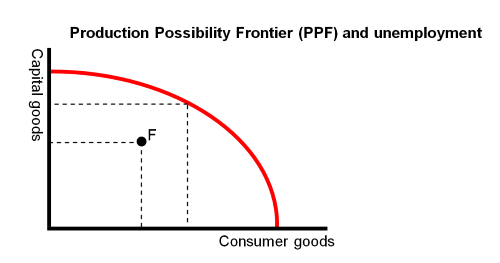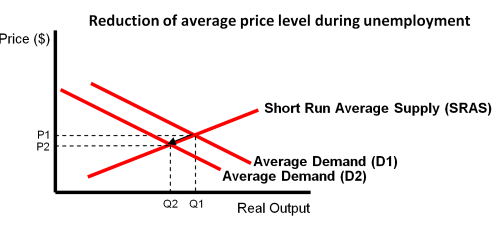This article is about costs and benefits of unemployment. It explains the effects, both negative and positive, of unemployment as well as the concept of the natural rate of unemployment.
Additionally, it describes the concepts of a trade-off between unemployment and inflation.
Costs of unemployment
Unemployment is a measure of the number of people out of work. Workers may be experiencing unemployment because:
- Wages are above equilibrium levels and have priced people out of the market.
- Their occupation is affected by the seasons.
- The economy is suffering a downturn, recession or depression.
- They have left or lost their job.
- The industry or region they work in is experiencing economic difficulty
This is how unemployment can occur, but there are also costs of unemployment to:
- Individuals and their dependents.
- Local community.
- Government finances.
- The economy.
Let’s take a look at these four costs of unemployment in details.
1. Costs of unemployment to individuals and their dependents
It clear that the people who lose the most from unemployment are the unemployed themselves. They lose money they would earn from their work and there are also psychological effects. It is natural to feel depressed, if unemployed, which can make finding work more difficult and there is a ‘social stigma’ towards the unemployed; some believe they are lazy, useless or even stupid.
When out of work it is more difficult for individuals to keep their skills up to date, including access to and familiarity with new technology and other developments. This problem makes it even harder to find employment and worsens with time, leading, potentially, to long-term unemployment.
Long-term unemployed therefore have the greatest cost to themselves and their families.
2. Costs of unemployment to local community
Widespread unemployment in a community or region may have numerous negative effects on the community such as the crime rate may increase, local shops and other businesses suffer from a fall in demand, and the environment may worsen – buildings may fall into a state of disrepair and neglect. This may have an effect on house prices and cause a decline in wealth.
3. Costs of unemployment to government finances
The government is negatively affected on two fronts.
Firstly, governments have to spend money assisting the unemployment by providing benefits, such as free training, public transport and of course job seekers allowance.
Secondly, when people are not in employment they are not paying Income TAX, and, in addition, they are spending significantly less, so government revenue from Value Added TAX (VAT) and other TAXes will also be decreased.
A greater level of spending and less income may also put additional pressure on governments to borrow, resulting in a positive Public Sector Net Cash Requirement (PSNCR) and an increase in national debt.
4. Costs of unemployment to the economy
Like government spending, the economy is affected on two fronts. Firstly, national output is reduced as those not in employment are not producing anything, so an economy has wasted resources and is not achieving its full potential, shown by point F inside the Production Possibility Frontier (PPF) as indicated on the chart below.

Secondly, there are also effects related to community such as an increase in crime, but also increased levels of unemployment will result in slower or negative economic growth.
Benefits of unemployment
Though it sounds like a paradox or contradiction in terms, a small amount of unemployment can actually provide some benefits for the economy, including:
- Lower inflation.
- Flexible labor market.
Let’s take a look at these two benefits of unemployment in details.
1. Lower inflation
Unemployment and increasing unemployment means that some members of society will be spending much less than they normally would. This of course causes an inward shift of the Average Demand (AD) from P1 to P2 and from Q1 to Q2, therefore reducing inflationary pressures on the economy as prices and quantities purchased go down.

2. Flexible labor markets
Unemployment means that workers are more likely to be flexible in terms of movement to another job or another location to work. This increased mobility can provide the economy with a more efficient allocation of resources resulting in greater overall productivity levels.
Flexibility may also be regarded as more flexible working conditions. Some people may be able to benefit from more flexible conditions such as working mothers, especially single mothers, e.g. in the form of job sharing.
Summary
Unemployment causes various costs to individuals, communities, governments, and even the whole economy, including not only financial costs but also psychological costs.
Though unemployment is regarded as a negative factor, it can reduce inflation and encourage labor to be more flexible.
